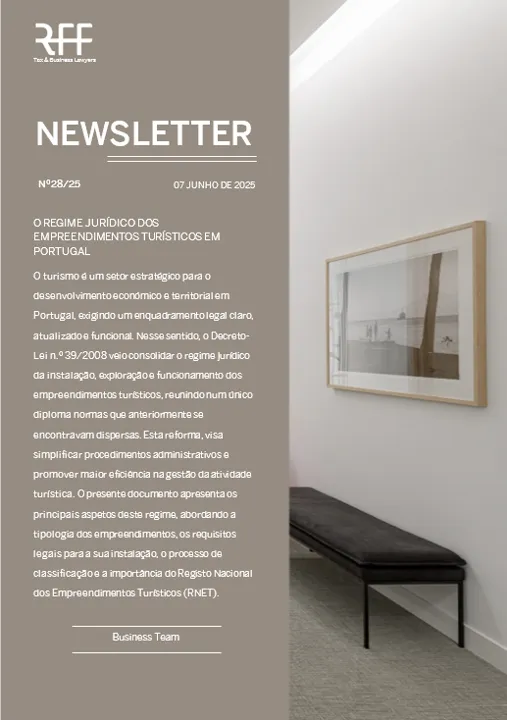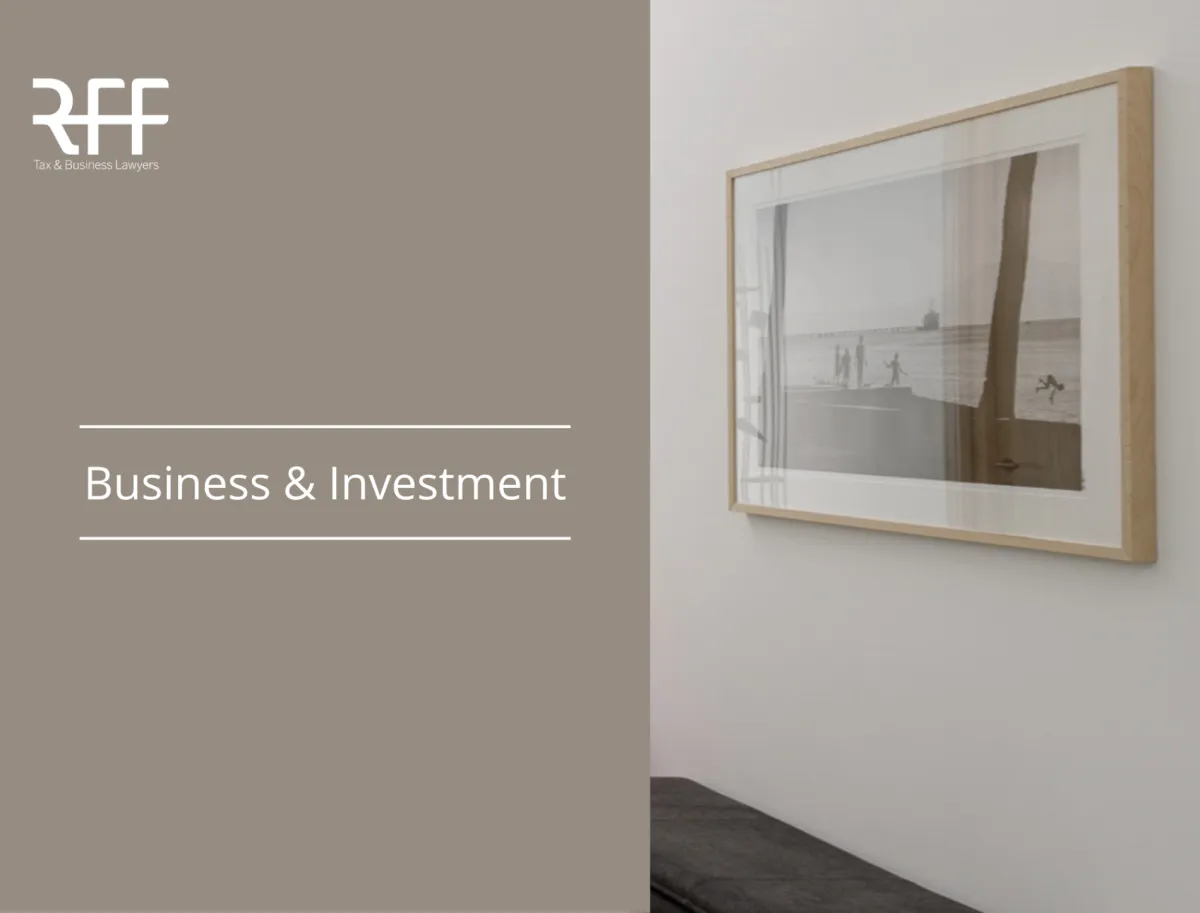Tourist Enterprises in Portugal – Legal Regime

Tourist Enterprises in Portugal – Legal Regime
Tourism is a strategic sector for economic and territorial development in Portugal, requiring a clear, up-to-date and functional legal framework. To this end, Decree-Law 39/2008 consolidated the legal framework for setting up, operating and running of tourist enterprises, bringing together rules that had previously been dispersed into a single statute. This reform aims to simplify administrative procedures and promote greater efficiency in tourism management. This document presents the main aspects of this regime, covering the types of enterprises, the legal requirements for setting them up, the classification process and the importance of the National Register of Tourist Enterprises (RNET).
FRAMING
Decree-Law 39/2008 establishes the legal framework for setting up, operating and running tourist enterprises. The aim of this Decree-Law was to bring together, in a single piece of legislation, the provisions common to all enterprises, to make it easier to access the rules regulating the activity.
This legislative initiative was developed in the wake of the Programa de Simplificação Administrativa e Legislativa (Administrative and Legislative Simplification Programme) – SIMPLEX 2007, in close coordination with the Legal Regime for Urbanisation and Building (RJUE), with the aim of reviewing the legislative framework for tourism and streamlining and simplifying the licensing procedure for tourist enterprises.
This legislative change established the National Register of Tourist Enterprises, under the responsibility of Turismo de Portugal, I.P., which must keep an up-to-date list of all tourist enterprises, with this information accessible to the public.
TOURIST ENTERPRISES
Tourist enterprises are establishments designed to provide accommodation services, in return of the payment of a fee, with an appropriate set of complementary structures, equipment and services.
Tourist enterprises can fall into different categories, according to their characteristics and purposes:
- Hotel establishments – these are intended to provide temporary accommodation and may also offer complementary services. This category includes hotels, flat hotels (or aparthotels) and hostels
- Tourist villages – these are groups of facilities integrated into a continuous space, with architectural coherence and internal connections that allow circulation, including of emergency vehicles. Although they may be crossed by municipal roads or paths and protected natural areas, they are designed to offer accommodation and tourism support services
- Tourist flats – these are an organised group of accommodation units (flats) in a building with common access. Their purpose is to provide accommodation and auxiliary services to tourists
- Tourist complexes (resorts) – similar to tourist villages, they differ in the fact that they have unified management of common services and infrastructures. They must include at least two tourist enterprises, one of which must be a hotel
- Housing tourist enterprises – located in old family properties with architectural, historical or artistic significance (such as manor houses or palaces), these enterprises are intended for tourist accommodation and can be located in urban or rural contexts
- Rural tourist enterprises – located in rural areas, they provide tourist accommodation, making the most of the local heritage (architectural, natural and landscape) by restoring, rehabilitating or extending existing buildings. They can take the form of country houses, agrotourism units or rural hotels
- Camping and caravanning parks – located on delimited and equipped land, they allow the installation of tents, caravans or motorhomes. They can be publicly or privately managed and are geared towards camping and caravanning
INSTALLATION AND OPERATION: REQUIREMENTS AND FORMALITIES
The installation of tourist enterprises must comply with the rules laid down in the Legal Regime for Urbanisation and Building (RJUE), as well as the technical standards applicable to buildings in general, namely in the areas of fire safety, public health, hygiene, noise control and energy efficiency.
The installation process follows the regime established in the applicable Decree-Law and is subject to the RJUE, covering all the urbanisation operations provided for therein. The application must be submitted in accordance with this regime and its regulations, accompanied by the documents defined in a joint ordinance issued by the members of the Government responsible for the areas of tourism and spatial planning. The applicant must also indicate the intended tourist classification for the enterprise.
The construction is subject to the submission of a prior notice with a deadline. Once the application and the required documents have been submitted, the mayor (or whoever he delegates) has 20 days to decide. After this period has elapsed without rejection, the communication is deemed to have been accepted, and this information is made available on the computerised system that manages urban planning procedures.
Any interested party can request prior information from the City Council on the possibility of installing a tourist enterprise, as well as on the applicable urban planning constraints.
In the case of tourist complexes (resorts), the request for information must cover all the enterprises and facilities that make up the complex.
The Council has 60 days to communicate its decision on the application, counting from the date of receipt of the application or delivery of the additional documents requested. It can decide unfavourably, considering the viability of the project.
Turismo de Portugal, I.P., as the National Tourism Authority, plays a central role in the process. Among its competences is the issuing of legal opinions, which can be requested by any interested party regarding:
- requests for prior information
- submission of prior communication (with or without a deadline)
- requests for licence works for enterprises such as hotels, tourist villages, tourist flats, resorts and rural hotels
The purpose of these legal opinions is to verify compliance with legal and regulatory standards, assessing whether the project is suitable for tourism use and the intended type. In the case of licensing or prior notification of works, the legal opinion must indicate the maximum capacity and type of enterprise based on the project submitted.
On completion of the works, the developer must request the City Council’s authorisation to use the property for tourism purposes, and the local authority is responsible for communicating this information to Turismo de Portugal, I.P.
The deadline for a decision and the issuing of the respective licence is, as a rule, 10 days after the application is submitted. If this time limit expires without an express decision or the issuing of the licence, the interested party can notify the City Council and Turismo de Portugal, I.P. of their intention to open the enterprise to the public.
The following are considered valid titles for opening the enterprise:
- the permit authorising use for tourism purposes, or
- proof of notification of the decision to open to the public, accompanied by proof of submission of the application and payment of the due fee
The authorisation of use for tourism purposes expires when (i) the enterprise does not start activity within one year of the authorisation being issued, (ii) a use other than that provided for in the license is given, (iii) the enterprise does not meet, or ceases to meet, the conditions to be classified as tourist.
When the licence expires, the City Counsil seizes the licence, which can happen on its own initiative in the case of camping parks, housing tourism enterprises and tourism in rural areas (except rural hotels) or at the request of Turismo de Portugal, I.P., in all other cases, by notifying the ASAE (Food and Economic Safety Authority).
In these cases, the enterprise must close, after notifying the operator.
CLASSIFICATION
Regarding the classification of tourist enterprises, Decree-Law 39/2008 introduced significant changes to the legal regime applicable to the installation, exploitation and operation of these enterprises.
While a system of compulsory classification has been maintained, it has become more flexible, no longer focussing solely on the physical characteristics of the infrastructure, but also on the quality of the services provided.
In this context, Ordinance 327/2008 defines the specific criteria for the installation, classification and operation of tourist enterprises, establishing the conditions to be met so that they can be classified in one of the categories ranging from one to five stars.
The award of this classification – applicable to hotel establishments, tourist villages and tourist flats – is based on an assessment of the quality of the services and facilities, according to the requirements set out in the ordinance.
To reach a certain category, establishments must fulfil a set of common requirements, namely:
- adequate conditions of hygiene, cleanliness, conservation and operation of facilities and equipment
- soundproofing of noisy machinery in areas accessible to customers, especially lifts and air conditioning systems
- existence of a waste storage system, whenever there is no public collection
- safety lighting in the event of an emergency
- fire prevention measures
- supply of hot and cold running water
- availability of a telephone connected to the outside network
These requirements apply to the various services offered by the enterprise, such as cleaning and laundry, food and beverages, and reception and concierge.
The classification process includes a compulsory audit, to be carried out within 60 days of the information on the enterprise’s valid opening permit being made available:
- in the case of hotels, villas, tourist flats, resorts and rural hotels, the Turismo de Portugal, I.P. is responsible for the audit
- for camping and caravan parks, residential tourism enterprises and rural tourism enterprises, the audit is carried out by the mayor
Based on the audit, the official classification is awarded by the competent authority (Turismo de Portugal or the City Counsil, as the case may be).
After the notification of the classification, the enterprise must, within a maximum of 10 days, display a plaque at the main entrance indicating the classification awarded.
The review of the classification must take place every five years, or at any time if requested by an interested party. This review will always be preceded by a new classification audit, carried out by the competent authority or an accredited organisation.
THE NATIONAL REGISTER OF TOURIST ENTERPRISES
The National Register of Tourist Enterprises (RNET) is made available online by Turismo de Portugal, I.P., through its official website.
This register brings together an up-to-date list of all tourist enterprises with a valid opening licence, including information such as the name of the enterprise, classification awarded, accommodation capacity, location (with geographical coordinates), address, periods of operation and identification of the entity responsible for the operation.
Whenever there are changes to the name, address, operating periods or operating entity, these must be communicated by the operating entity to Turismo de Portugal, I.P., within 10 days of the change taking place, by registering directly on the RNET platform.
CONCLUSION
The legislation applicable to tourist enterprises in Portugal represents a significant effort to simplify, make transparent and modernise the sector. By defining clear rules for the installation, operation and classification of enterprises, the legal regime in force contributes to a more qualified, safe and competitive tourism offer.
At the same time, tools such as RNET guarantee public access to reliable and up-to-date information, promoting consumer confidence and the responsibility of tourism operators. Thus, the legal framework established constitutes an essential pillar for the sustainable development of Tourism in Portugal.
***
Rogério Fernandes Ferreira
Marta Machado de Almeida
Patrícia Largueiras
Inês Dias de Pinho
Miriam Vicente
Carolina Gomes Alves
